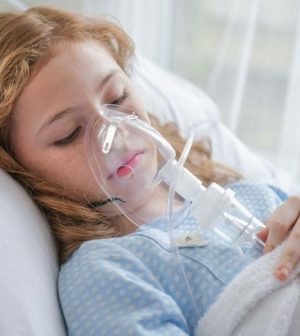- 10 Strategies to Overcome Insomnia
- Could Artificial Sweeteners Be Aging the Brain Faster?
- Techniques for Soothing Your Nervous System
- Does the Water in Your House Smell Funny? Here’s Why
- Can a Daily Dose of Apple Cider Vinegar Actually Aid Weight Loss?
- 6 Health Beverages That Can Actually Spike Your Blood Sugar
- Treatment Options for Social Anxiety Disorder
- Understanding the Connection Between Anxiety and Depression
- How Daily Prunes Can Influence Cholesterol and Inflammation
- When to Take B12 for Better Absorption and Energy
COVID Can Affect Brains of Hospitalized Kids

And the kids who developed these headaches or experienced an altered mental status known as acute encephalopathy were more likely to need intensive care, said researchers from the University of Pittsburgh Medical Center (UPMC), in Pennsylvania.
“The SARS-CoV-2 virus can affect pediatric patients in different ways: It can cause acute disease, where symptomatic illness comes on soon after infection, or children may develop an inflammatory condition called MIS-C weeks after clearing the virus,” said lead study author Dr. Ericka Fink. She is a pediatric intensivist at the UPMC Children’s Hospital of Pittsburgh.
The study findings were published recently in the journal Pediatric Neurology. They are the first insights from the pediatric arm of GCS-NeuroCOVID, an international, multicenter consortium aiming to understand how COVID-19 affects the brain and nervous system.
“One of the consortium’s big questions was whether neurological manifestations are similar or different in pediatric patients, depending on which of these two conditions they have,” Fink said in a hospital news release.
For the study, the researchers reviewed the cases of 1,493 children who were cared for at 30 pediatric critical care centers around the world. Those included 1,278, or 86%, of patients who were diagnosed with acute COVID-19 and 215 kids with MIS-C, the multisystem inflammatory syndrome that can appear several weeks after children have recovered from the virus.
The research team found that neurological symptoms were more common in kids with MIS-C, who were also more likely to have two or more of those symptoms.
In the children with MIS-C, researchers often saw headaches, acute encephalopathy and dizziness. In the children who had acute COVID-19, they also saw headache and acute encephalopathy, as well as seizures. Less commonly, symptoms included loss of smell, vision impairment, stroke and psychosis.
About 44% of children from these two groups had neurological symptoms.
“Thankfully, mortality rates in children are low for both acute SARS-CoV-2 and MIS-C,” Fink said. “But this study shows that the frequency of neurological manifestations is high — and it may actually be higher than what we found because these symptoms are not always documented in the medical record or accessible. For example, we can’t know if a baby is having a headache.”
The research team is now doing a follow-up study to determine whether the COVID-19 virus or MIS-C can have lasting effects on children’s health or quality of life, whether they have these neurological symptoms or not.
“Another long-term goal of this study is to build a database that tracks neurological manifestations over time — not just for SARS-CoV-2, but for other types of infections as well,” Fink added. “Some countries have excellent databases that allow them to easily track and compare children who are hospitalized, but we don’t have such a resource in the U.S.”
More information
The U.S. Centers for Disease Control and Prevention has more on COVID-19.
SOURCE: University of Pittsburgh School of Medicine, news release, Jan. 21, 2022
Source: HealthDay
Copyright © 2026 HealthDay. All rights reserved.










